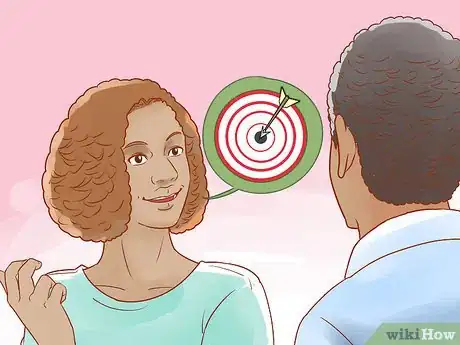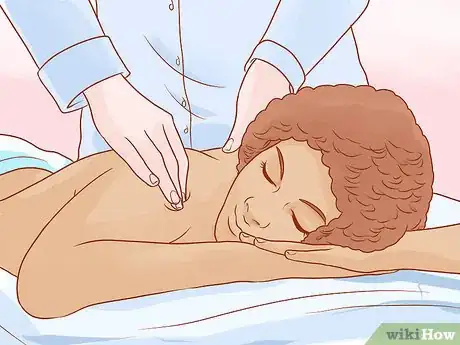This article was co-authored by Allen Wagner, MFT, MA. Allen Wagner is a licensed marriage and family therapist based in Los Angeles, California. He received his Master's in Psychology from Pepperdine University in 2004. He specializes in working with individuals and couples on ways they can improve their relationships. Along with his wife, Talia Wagner, he's the author of Married Roommates.
There are 8 references cited in this article, which can be found at the bottom of the page.
This article has been viewed 39,623 times.
Infidelity is a traumatic and painful event in any type of committed relationship. It puts tension on a marriage and your emotions can make it difficult to stay calm. Get a grip on the situation by calming down and identifying your emotions. Then, you can begin to deal with the situation in a productive way.
Steps
Calmly Confronting Your Husband
-
1Calm yourself before the conversation. Take a moment to relax before you have a difficult talk with your husband. Give yourself as much time as you need to calm down and emotionally prepare yourself.
- Listen to music. Music can significantly alter your mood. Listen to something that you know relaxes you. Listen to that song in the time leading up to a difficult conversation.[1]
- Do some light exercise. Exercise distracts your mind from whatever is agitating your emotions. You don’t have to work up a sweat to feel the benefits. Try taking a ten to thirty minute walk.[2]
- Take deep breaths. One way to remain calm is to take slow, deep breaths. Inhale slowly through your nose as you count to five. Hold your breath for seven seconds. Exhale slowly as you count to eight. Repeat up to ten times to feel relaxed.[3]
-
2Take a moment to identify your feelings. Taking the time to notice how you are feeling and consider what is causing you to feel that way may help you to confront your husband. After you have calmed down, such as by using deep breathing, progressive muscle relaxation, or meditation, ask yourself some questions to identify and understand your feelings.[4]
- What am I feeling in this moment?
- Where in my body do I feel this emotion?
- What is the shape of this feeling?
- What color is the feeling?
Advertisement -
3Find a healthy outlet for your feelings. After you have taken some time to identify your feelings, look for a healthy way to express your feelings. There are many different ways to do this, so choose something that seems like it will work for you. Some things you can try include:
- Exercising, such as by taking a walk, going for a bike ride, or taking an aerobics class.
- Writing in a journal.
- Doing something creative like painting, playing an instrument, or baking a cake.
- Talking with a friend about how you are feeling.
-
4Get the facts straight. Talk to your husband about the affair. Do your best to calmly find out the general facts about the affair. Avoid getting too many explicit details, as that may be traumatic for you in the long run.[5]
- Limit your questions to finding out how the affair started, how often he saw his lover, and who else might know about it.[6]
-
5Find out if your husband intends to stop cheating. There are various reasons that people cheat on their spouses. Infidelity ranges from a meaningless indiscretion to a means of escape from a troubled marriage.
- Ask your husband if he wants to continue your marriage and is committed to making a change that is satisfactory for both of you. For some couples this means that he must stop cheating completely. For others, you may decide to pursue a different type of marital arrangement.[7]
-
6Avoid blaming. It is normal to feel angry and upset. Your goal is to stay calm. Getting into an argument in which you blame each other for your problems will probably not help you stay calm.[8]
- Both partners should avoid making statements like, “This is all your fault because…” Blame will only make the other person feel guilty, hurt, and more likely to respond with an accusation that ignites an unproductive cycle.[9]
- Instead, try to keep calm by taking deep breaths and listening to your husband, as challenging as it may be. Use “I” statements that reflect only your own feelings. For example, “I felt really insecure and lonely when you said you were working late all week.”
- Be kind to yourself. Even if you aren’t able to keep calm and avoid blaming, there will be more opportunities to talk with your husband. The first conversation is not easy. Couple’s therapy and later discussions will give you a chance to have a calm discussion.
EXPERT TIPAllen Wagner is a licensed marriage and family therapist based in Los Angeles, California. He received his Master's in Psychology from Pepperdine University in 2004. He specializes in working with individuals and couples on ways they can improve their relationships. Along with his wife, Talia Wagner, he's the author of Married Roommates.Marriage & Family Therapist
 Allen Wagner, MFT, MA
Allen Wagner, MFT, MA
Marriage & Family TherapistDon't compare your relationship to that of the affair. If your partner were to leave you and run with the affair, they would suddenly see that the new relationship now has expectations too. When there’s no expectations, that person is not criticizing them, they’re not disappointed by them, and anybody in a relationship will be disappointed by their partner sometimes, or criticize their partner sometimes, because they want to implement change.
-
7Think about how to move forward. Evaluate the relationship after the initial shock has worn off. You and your partner will have to decide if and how you want to continue your relationship. This is a big decision to make. It is not recommended that you make such decisions immediately. It may be best to give yourselves a few weeks to think it over and speak with your therapist.
-
8Suggest couple’s therapy. It is not a good idea to make any big decisions about your marriage right after discovering an affair. You or your husband may not be sure if you want to stay in the relationship. Therapy can be useful in determining the right course of action for both of you.[12]
- Check with your insurance company to see if they cover couple’s therapy in your area. If so, call some therapists and set up a meeting.
- Get in touch with a therapist that you know, or a friend who sees a therapist. You don’t have to see your friend’s therapist, but that therapist may be able to recommend another therapist that suits your needs.
Taking Care of Your Needs
-
1Accept that it will take time to recover. Give yourself some time to come to terms with your husband’s infidelity. The first few weeks can be quite challenging. It may take months for you to feel better. [13]
-
2Pamper yourself. Go to yoga, get a massage, see a movie, exercise. Do whatever you need to do to lower your stress and calm down. It is very important to take care of yourself as best you can. That way you will be better equipped to confront whatever challenges arise in making decisions about your relationship.[14]
-
3Communicate. Reach out to a trusted friend or family member who can support you. It is hard be alone when your husband is cheating. Talking to a friend can help you vent frustration or anger.[15]
- Try writing in a journal. Putting your feelings on paper can be therapeutic and calming.
-
4Find a therapist. You may plan to see a couple’s therapist with your husband, but it may also be useful to go to therapy on your own. Even if a close friend or family member is willing to listen to you, there is only so much time they can dedicate to your problems. A professional can help you evaluate why the affair happened and support you in your decision to either salvage or end your relationship.[16]
Avoiding Problematic Reactions
-
1Avoid making decisions when you first find out. You will probably not feel calm when you find out that your husband is cheating. That is perfectly normal, so you don’t want to make any big decisions. It is not necessary to immediately decide whether you want to repair your marriage or separate. The first two or three weeks of are likely to be the worst period of initial shock.[17]
- Don’t make decisions about your marriage, your children, or any other important things. Give yourself as many weeks or months as you need to start thinking clearly again.[18]
-
2Refrain from over exposing your husband. If you want to repair your relationship, it might not be beneficial to tell everyone about your husband's infidelity. You don’t know what will happen with your relationship in the future, so be careful about who you talk to.[19]
- For example, you might decide to stay with your husband and work towards repairing your relationship. Things might be going well between the two of you, but it will be much harder for things to go back to normal if your friends and family have negative feelings toward him.
- Reach out to a person who you know you can trust to support you through this difficult time.
-
3Avoid seeking revenge. Do not try to get back at your husband or hurt the person he was seeing. Avoid physical, social, or emotional retaliation. You don’t want to do something that will hurt you in the future.[20]
- Do not cheat on him, physically hurt him, or try to expose him. This will only cause more problems in your marriage, especially if you later try to work things out.
- Do not retaliate against your husband’s lover. You don’t know the other person, and you put yourself at risk when you don’t know how they will react. Any sort of retaliation will likely only lead to more problems for you and your relationship.
References
- ↑ https://www.psychologytoday.com/articles/200304/how-remain-calm-during-uneasy-times
- ↑ https://www.psychologytoday.com/articles/200304/how-remain-calm-during-uneasy-times
- ↑ https://www.psychologytoday.com/articles/200304/how-remain-calm-during-uneasy-times
- ↑ http://www.cognitivehealing.com/depression/learn-how-to-identify-and-express-your-feelings/
- ↑ http://www.zurinstitute.com/infidelity_affairs.pdf
- ↑ http://www.zurinstitute.com/infidelity_affairs.pdf
- ↑ http://www.zurinstitute.com/infidelity_affairs.pdf
- ↑ http://www.professional-counselling.com/dealing-with-infidelity.html
- ↑ https://www.psychologytoday.com/blog/our-empathic-nature/201411/how-stop-fighting-your-partner
- ↑ http://www.professional-counselling.com/dealing-with-infidelity.html
- ↑ http://www.professional-counselling.com/dealing-with-infidelity.html
- ↑ http://www.professional-counselling.com/dealing-with-infidelity.html
- ↑ http://www.professional-counselling.com/dealing-with-infidelity.html
- ↑ http://www.huffingtonpost.com/tammy-nelson-phd/the-six-steps-of-recovery_b_2936252.html
- ↑ http://www.huffingtonpost.com/tammy-nelson-phd/the-six-steps-of-recovery_b_2936252.html
- ↑ http://family-psychology.com/crisis-of-infidelity/
- ↑ http://www.professional-counselling.com/dealing-with-infidelity.html
- ↑ https://www.gosmartlife.com/surviving-infidelity/mistakes-to-avoid-after-the-affair
- ↑ https://www.gosmartlife.com/surviving-infidelity/mistakes-to-avoid-after-the-affair
- ↑ https://www.gosmartlife.com/surviving-infidelity/mistakes-to-avoid-after-the-affair










































































